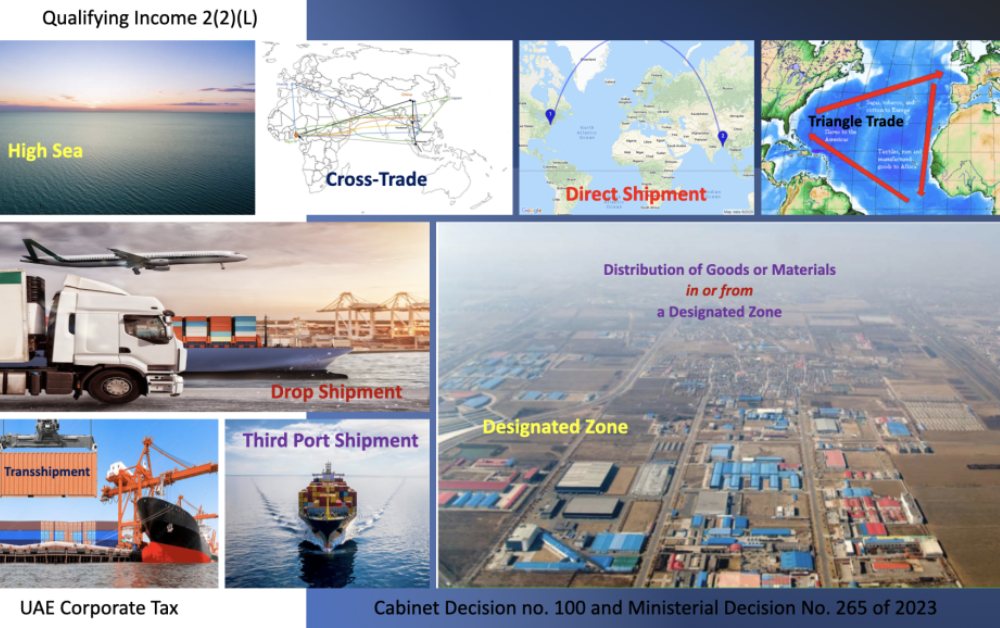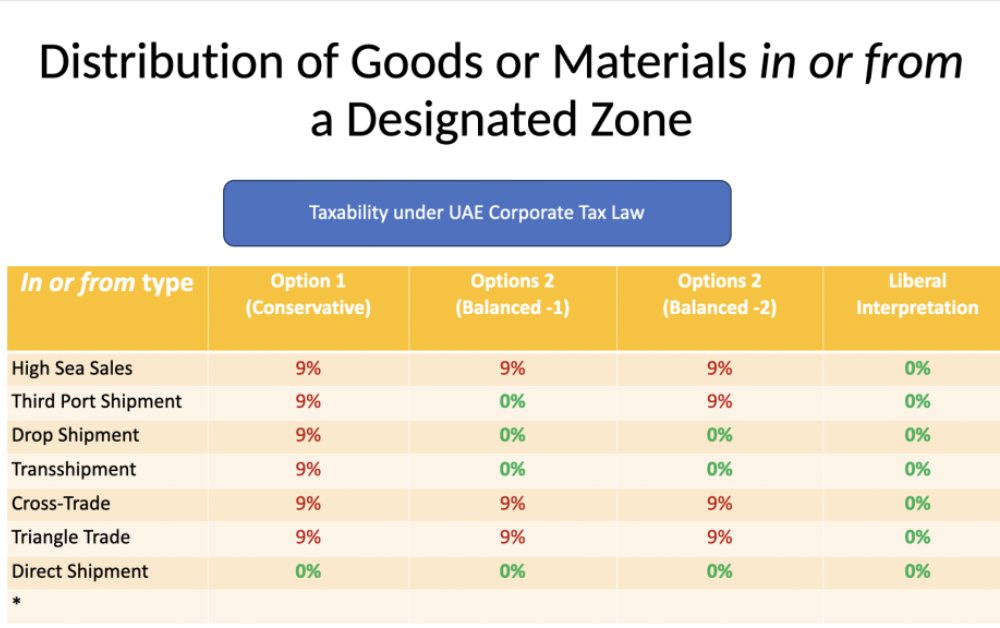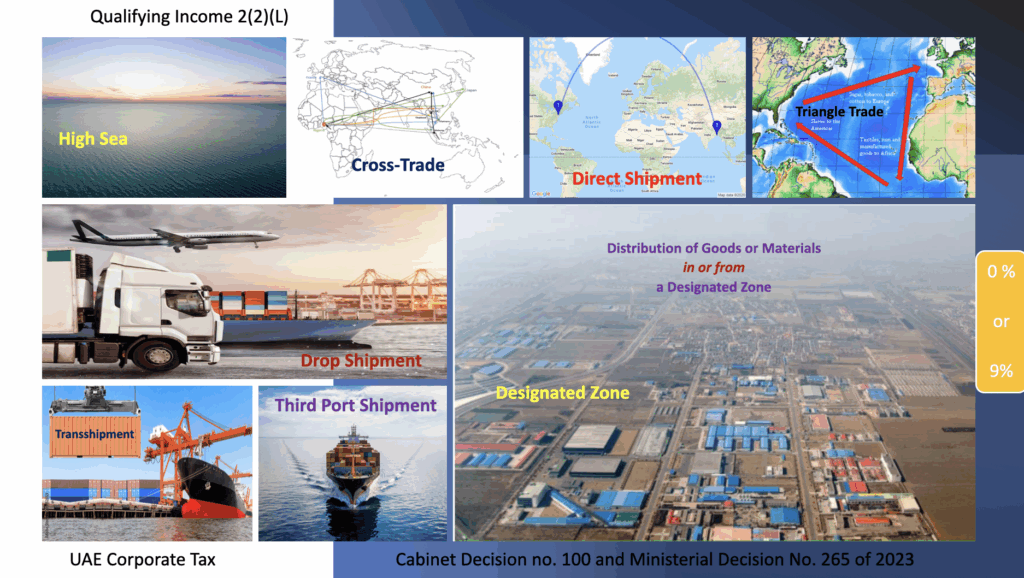
Qualifying Activities generate Qualifying Income, Qualifying Income makes a Free Zone Person as a Qualifying Free Zone Person and then only automatic eligible for 0% Corporate Tax Rate, whether the transaction is with another Free Zone entity or Non-Free Zone entity.
One of the 13 Qualifying Activities is: Distribution of Goods or materials in or from a Designated Zone
In order to arrive at a definite or a set of options for its taxability pending the ultimate clarification by Ministry of Finance, if at all any, one has to take into account the objective and purpose of introducing the Corporate Tax in UAE.

“The introduction of Corporate Tax is intended to help the UAE achieve its strategic objectives and accelerate its development and transformation. The certainty of a competitive Corporate Tax regime that adheres to international standards, together with the UAE’s extensive network of double tax treaties, will cement the UAE’s position as a leading jurisdiction for business and investment.
Given the position of the UAE as an international business hub and global financial centre, the UAE Corporate Tax regime builds from best practices globally and incorporates principles that are internationally known and accepted. This ensures that the UAE Corporate Tax regime will be readily understood and is clear in its implications”
It is quite important to note that, International trade practices and the taxation of income generated from them vary significantly based on the country and the specific tax laws in place. There are two types of taxation system:
1. Worldwide Taxation System (where residents and entities based in a country are taxed on their worldwide income) and
2. Territorial Taxation System (where the tax is only on the income that is earned within their borders)
The approach to taxing income from international trade depends on whether a country uses a worldwide or territorial taxation system. UAE uses a hybrid system. UAE taxes residents on their worldwide income, but with exceptions for non-residents who may not have to pay tax on their foreign income unless it’s relating to their businesses conducted from UAE.

This section discuss the specific provisions of Cabinet Decision No. 100 of 2023 on Determining Qualifying Income for the Qualifying Free Zone Person And Ministerial Decision No. 265 of 2023 on Qualifying Activities and Excluded-Activities
i. Designated Zone: A designated zone according to what is stated in Federal Decree-Law No. (8) of 2017 on Value Added Tax, and which has been included as a Free Zone in accordance with the Corporate Tax Law.
ii. “Distribution of Goods”: It refers to the entire process and logistics involved in moving gods and materials from the point of production or manufacture to the final point of sale or consumption. The distribution of goods is a complex and integral part of the global economy, impacting supply chains across industries and influencing how consumers access products.
iii. Distribution of goods or materials in or from a Designated Zone, includes the buying and selling of goods, materials, component parts or any other items that are tangible or movable and may include the importation, storage, inventory management, handling, transportation and exportation of those goods or materials to a customer that resells such goods or materials, or parts thereof or processes or alters such goods or materials or parts thereof for the purposes of sale or resale, provided such activities are conducted in or from a Designated Zone and the goods or materials entering the State are imported through the Designated Zone.”
Each of these terms represents a specific method or approach to the movement and trade of goods or materials in the global market, with distinct rules, processes, and implications for all parties involved. Their obvious and only purpose is to optimize efficiency, cost, and market reach.
In summary, these practices can be used for legitimate tax optimization, there is a potential for misuse. It’s important for businesses to engage in these transactions with a clear understanding of the legal and ethical implications, ensuring compliance with all relevant laws and regulations.
High Sea Sales: Sale of goods during transit before they enter the destination country’s customs frontier.
Third Port Shipment: Shipment of goods from one country to a buyer in another, via a port in a third country.
Drop Shipment: Retail fulfillment where a store sells a product, which is then shipped directly to the customer by a third party.
Transshipment: The process of shipping goods to an intermediate destination before reaching the final destination.
Cross Trade: Shipping of goods between two countries by a seller located in a third country.
Triangle Trade: Involves three parties from three different countries, with goods moving from the source country to the buyer through an intermediary.
Direct Shipment: Straightforward shipping of goods directly from the supplier to the buyer without intermediate handling.
Option 1 (Conservative): Except Direct Shipment (taxable @0%), all other forms are Taxable @9%
This is based on strict interpretation of the wordings of the law and its two decisions.
Based on the definitions and explanations provided in Cabinet Decision and Ministerial Decisions [“two decisions”], these International Trade Practices and Logistics for Distribution of goods or materials may not align with the described Qualifying Activity. The definition emphasizes activities conducted in or from a Designated Zone, involving tangible or movable goods, including importation, storage, handling, and exportation.
High Sea Sales occur before goods enter the UAE, Third Port Shipments & Cross Trade involve shipment via a third country, Drop Shipments & Triangle Trade involve direct shipping from the manufacturer/wholesaler/stockist to the customer, Transshipment involves a third port, often bypassing the seller’s handling. These types of transactions don’t strictly fit the criteria of activities conducted in or from a Designated Zone as outlined in the two Decisions.
Option 2 (Balanced Approach-1): Except Direct Shipment, Transshipment, Drop Shipment and Third Port shipment (taxable @0%), all other forms are Taxable @9%
These being so as to remain aligned with the objective of UAE being international business hub. Moreover,the inclusion of ‘Designated Zone’ in the definition and to give advantage over non-designated zone free zones make this taxability conclusion even more plausible.
Option 3 (Balanced Approach-2): Except Direct Shipment, Transshipment and Drop Shipment (taxable @0%), all other forms are Taxable @9%
Further fine tuning Balanced -1 approach as above
Option 4 (Liberal interpretation): All forms are not taxable (taxable @ 0%)
This is based on liberal interpretation of the wordings and phrases: ‘include’. ‘may include’ and ‘provided’ and linking them together with the overall intent of classifying ‘Distribution of goods or materials in or from a Designate Zone’ as Qualifying Activity.
Q1: Now, why will United Arab Emirates, which is one of the major international trade hubs, tax these at the cost of congesting its seaports?
Answer 1: The taxation of High Sea Sales, Third Port Shipments, and Drop Shipments and similar by UAE, despite being a major international trade hub, could be influenced by several factors:
It’s important to note that such decisions are typically part of a larger economic strategy, considering various aspects like trade facilitation, revenue generation, and international trade relations.

Q2: Why there is a delay in providing complete clarity by the tax authorities, despite the passage of over 12 months since the law’s issuance and the replacement of two Cabinet and Ministerial Decisions?
Answer 2: This delay can be attributed to several factors:
The ambiguity, while challenging, is not uncommon in the implementation of new and complex legal frameworks, especially those with significant economic implications.
Comment 1: Broader Definition of Distribution. If “distribution” includes more than buying and selling, it could encompass activities like High Sea Sales, Third Port Shipments, and Drop Shipments.
Comment 2: Designated Zones Focus: The focus on Designated Zones might aim to encourage certain economic activities within these zones, possibly excluding the mentioned transactions if they don’t physically involve these zones.
Comment 3: Importance of Phrasing. The use of “may include” and “provided” suggests flexibility in interpretation, which could either include or exclude these activities depending on the broader intent of the law.
Comment 4: VAT and Corporate Tax (CT) Considerations. Under UAE VAT Laws, goods are considered neither imported (Designated Zone being Out of UAE for import purpose) nor exported (considered as Out of Scope supply). Perhaps, by considering distribution of goods or materials as Qualifying Activity under Corporate Tax Law, UAE Tax Authorities might be considering capturing revenue from these transactions not covered under VAT but keeping the taxability @0%.
Comment 5: Operational Efficiency at Ports. Concern about port congestion without value addition need to be evaluated before arriving at any conclusion about taxabaility. Taxing activities that don’t physically use port facilities might be counterintuitive.
These comments suggest a complex interplay between tax policy, trade facilitation, and economic strategy, requiring a careful balance to align with the UAE’s broader economic objectives.
Distribution of Good or materials in or from a Designated Zone is a Qualifying Activity subject to 0% Corporate Tax on its net profit. There are various forms and practices of distribution of goods or materials in international trade. This article has mentioned most of them and their nature, with a view to deduce whether each one of them or collectively will be taxable @ 0% or otherwise @9%.
A liberal interpretation of the relevant provisions clearly indicate towards 0% taxability. But its interplay with UAE’s Strategy towards trade facilitation, other Non-designated Free Zones to align with broader economic objective of accelerate development and transformation of its economy, may tilt the balance toward 9% taxability or remain status quo.
There is a need for ongoing update, dialogue, and clarification from UAE tax authorities on this front, for sure.